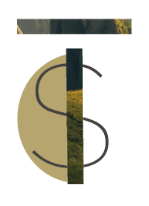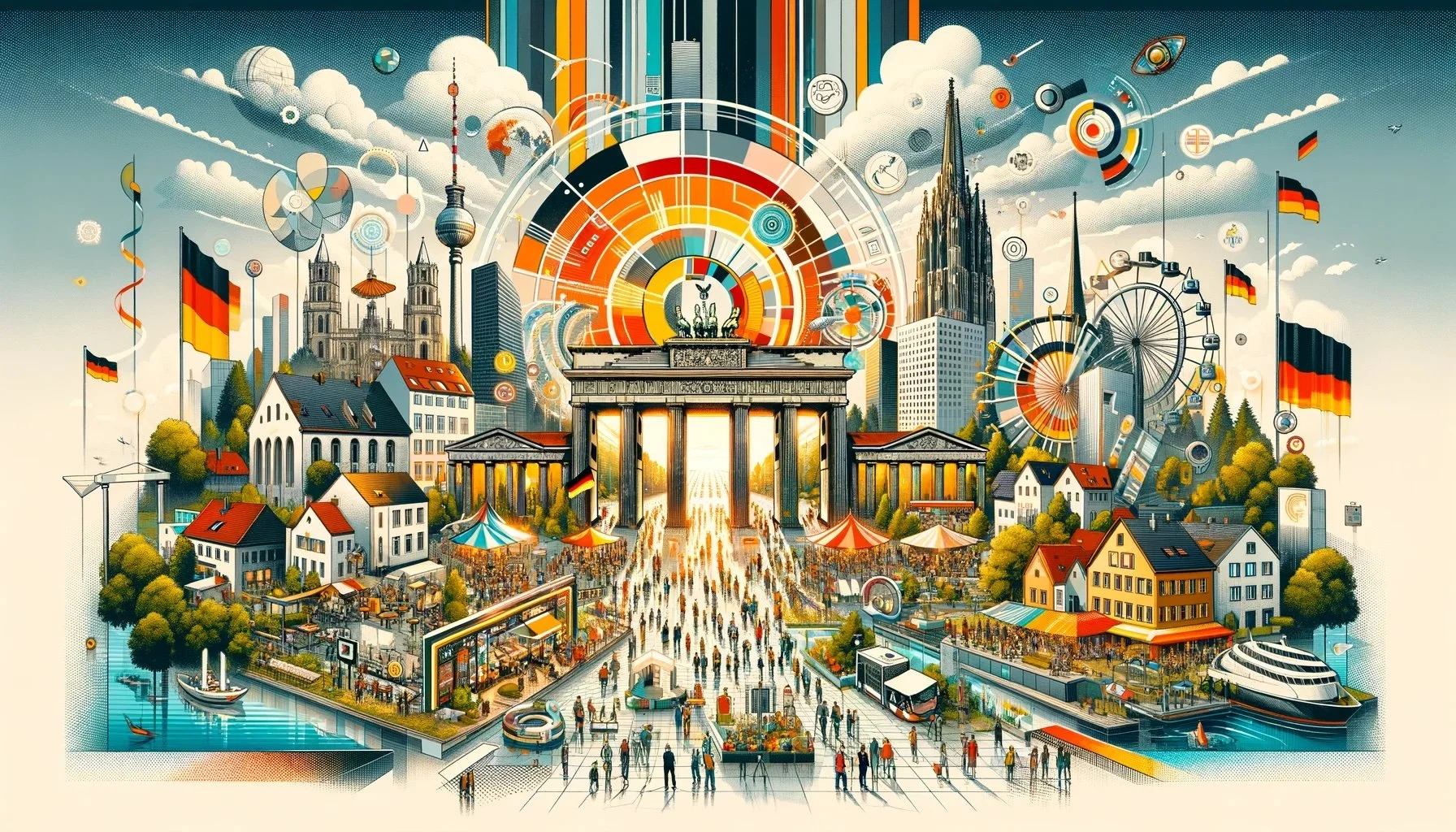Visionary Horizons: Germany's Leap into a Progressive Future
The following blog post is based on my opening address at the Vernissage opening of “NEW HORIZONS: Missionen für Deutschland” on March 1st, 2024 in Berlin
On March 1st, 2024, I had the privilege of delivering the opening remarks at a vernissage of the D2045 New Horizons for Germany project. This event marked the unveiling of an exhibition featuring artifacts of the future, inspired by the new set of scenarios crafted by the D2030 – Deutschland neu denken e.V. initiative. My speech focused on enlightening the distinct approaches of Futures Thinking, along with presenting some forward-looking perspectives for Germany. I am sharing my speech here for you to read and comment. In what role do you see Germany in the future?
“Welcome, everyone. It's an honor to deliver the opening remarks for today's exhibition of "New Horizons: Missions for Germany." Germany has a storied past as the land of poets and thinkers, each a pioneer in their unique understanding of the world. As we look towards the future, it's essential to explore the vast possibilities that lie ahead – those we must prepare for, and those we hope to shape actively.
Today, I wish to delve into the tension between the push and the pull of the future, a pivotal aspect that distinguishes futures thinking across the globe. We encounter two primary approaches: the quantitative analytical approach, which aims to identify various futures scenarios based on current trends, AND the visionary approach, where we leap into the future and, instead of anticipating what might emerge, we envision what should unfold. We ask ourselves: What are the futures we prefer and desire? What are the futures we want to live in?
A critical limitation of analyzing the future solely from a present-day perspective is our inherent biases and assumptions. In today's world, we are constantly bombarded with negative portrayals of the future in news, movies, and other media forms. If I were to ask you now to list ten ways how to destroy our planet, you'd likely have no trouble answering. But could you as easily list ten ways how to save it?
This imbalance in our exposure blurs our perception, leading us to identify trends that align with these negative images. This tunnel vision means we often overlook the potential for positive, hopeful futures. What if we instead focused on envisioning a future society with values, education, and intangible qualities that we aspire to? What if we replaced some of the negative images in our heads with positive ones and nurtured the small seeds of hope in the present, guiding us toward better futures?
The push and the pull of the future is like learning how to dance with uncertainty. Just as you need the right steps to be comfortable on the dance floor, you require the right methods to explore the future. However, without feeling the rhythm of the music, dancing becomes challenging. Similarly, lacking a futures mindset hinders your ability to shape the future.
Let's now focus on Germany. We are currently the world’s third-largest economy, a position of leadership, with many nations emulating our steps. Yet, it appears that Germany has lost its boldness, its era of "Sturm und Drang" – a time of turbulence and drive that unleashed immense creative potential.
What if we could lead not just with our GDP and technological advancements but also with innovative approaches to modern democracy, inclusivity, and societal engagement? We need to hear the untold stories of our people, to listen, learn, and collectively imagine futures that we all yearn to live in – a future we want to build for the generations to come.
During the peak of immigration in 2015, I found myself in Australia, amidst my Foresight Studies, surrounded by peers from various European countries. Being far from home, we realized our shared European identity and felt more connected than at home. Back then, we experienced together the global reaction to Angela Merkel's declaration, "Wir schaffen das" – "We can do it," as we opened our borders and welcomed refugees, it was a profound experience.
This gesture of openness and solidarity reached across continents, filling me with pride in my German heritage – a sentiment not easily expressed due to our dark past. Yet, at that moment, people worldwide saw Germany as a trailblazer, painting new pathways of possibility instead of devoting to fear.
This journey, however, has been far from easy. The lesson here is clear: opening borders is just the beginning. We need narratives that foster reconnection and strengthen our empathy for those facing hardships. Everyone in Germany, born here or immigrated, should feel they can make a valuable contribution to our country once we replace fear and hopelessness with perspective, self-confidence, and pathways for change and inclusion.
Many challenges lie ahead – from demographic shifts and the need for skilled specialists to the increasing polarization within our society, fueling both the far right and far left. We've unlearned how to debate, how to comfortably reside in the middle ground, accepting disagreements while striving to understand differing perspectives.
Germany, with its heritage of exceptional engineering and automation, is well-positioned to lead in new technologies. To do so, we must focus on our core competencies and shift our attention from maintaining outdated products and services to tackling future challenges with our unique skill set.
Let's reclaim our bravery and embrace the leadership role Europe sees in us. As Europe's largest economy, we should use our strength to assist others, to be open and approachable, and not demand conformity to our language and ways, and we must never forget our past as we strive for a united future.
With global issues like climate change, global trade, and current geopolitical tensions, I sometimes wish we could all experience the 'Overview Effect' – the profound realization astronauts have when viewing Earth from space. This perspective shows us that we share the same air, and national borders are nothing but man-made constructs, that do little to address global problems.
We face a choice: do we focus on saving ourselves, thus dooming the world in the long run, or do we strive to see the bigger picture and what's needed for every being on this planet to have a fair chance at life and prosperity?
Let's decide to actively shape our futures and lead by example, creating a society that we and the next generation can be proud of. Let's be bold enough to explore new pathways that serve the greater good, rather than watch our society slide into polarization and blame. Let's imagine who we can be and how we can get there, not being held back by our fears but propelled by our dreams of what we can create.
In conclusion, it is up to each of us to decide whether we fall into a pessimistic worldview or take a chance to imagine a country and a world we all want to live in.
It's ironic that one of the world's most thriving economies is steeped in pessimism. Let's focus less on talking and more on doing for a Germany that leads Europe not from a position of superiority but as the foundation that unites Europe and the world instead of dividing it. By offering everyone in our country a fair chance to become part of society, we can avoid the shadows of exclusion.
There is no single future; futures only exist in multiples before one manifests in the present. Let's be brave enough to explore and imagine the 'what ifs' – the opportunities, instead of merely trying to prepare for what lies ahead. Let's find the fuel to create hope.
For those who wish to unite internationally at the level of futures thinking, I extend an invitation to join the APF. We are an association working to spread the understanding of foresight, so everyone knows what it means to be a Futurist and why it's essential for us all to adopt this mindset, not to be held back by our past but to use our learnings to shape fantastic futures.
Thank you all, and enjoy the exhibition today and in the coming week.”
What role do you see Germany playing in the global context in the future? Please comment below.

